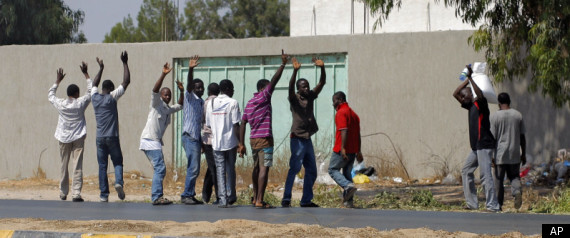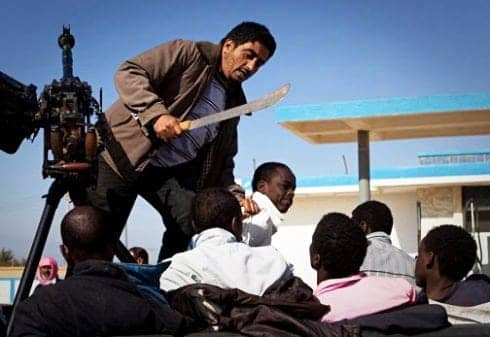The Libyans are going to have to stop this racist shit, most Gaddafi mercenaries have left the country weeks ago.
Libyan Rebels Detain Black Africans As Suspected Gaddafi Mercenaries

Libyan Rebels Detain Black Africans As Suspected Gaddafi Mercenaries

Libyan Rebels Detain Black Africans As Suspected Gaddafi Mercenaries

TRIPOLI, Libya Rebel forces and armed civilians are rounding up thousands of black Libyans and migrants from sub-Sahara Africa, accusing them of fighting for ousted strongman Moammar Gadhafi and holding them in makeshift jails across the capital.
Virtually all of the detainees say they are innocent migrant workers, and in most cases there is no evidence that they are lying. But that is not stopping the rebels from placing the men in facilities like the Gate of the Sea sports club, where about 200 detainees all black clustered on a soccer field this week, bunching against a high wall to avoid the scorching sun.
Handling the prisoners is one of the first major tests for the rebel leaders, who are scrambling to set up a government that they promise will respect human rights and international norms, unlike the dictatorship they overthrew.
The rebels' National Transitional Council has called on fighters not to abuse prisoners and says those accused of crimes will receive fair trials.There has been little credible evidence of rebels killing or systematically abusing captives during the six-month conflict. Still, the African Union and Amnesty International have protested the treatment of blacks inside Libya, saying there is a potential for serious abuse.
Aladdin Mabrouk, a spokesman for Tripoli's military council, said no one knows how many people have been detained in the city, but he guessed more than 5,000. While no central registry exists, he said neighborhood councils he knows have between 200 and 300 prisoners each. The city of 1.8 million has dozens of such groups.
Justice Minister Mohammed al-Alagi told reporters this week that he'd visited several detention centers and found conditions "up to international standards."
"We are building a Libya of tolerance and freedom, not of revenge," he said.
Oil-rich but with a relatively small population of 6.6. million, Gadhafi's Libya welcomed hundreds of thousands of black Africans looking for work in recent decades. Many young citizens of Mali and Niger who flocked to Libya in the 1970s and 1980s were recruited into an "Islamic Legion" modeled on the French Foreign Legion. In addition, Gadhafi's military recruited heavily from black tribes in Libya's south.
In February, witnesses reported African fighters shooting at protesters or being captured by anti-Gadhafi forces. Witnesses have described scores of mercenaries being flown in to put down the rebellion, although many of the fighters already were in Libya.
As a result, people with roots in sub-Saharan Africa and black Libyan citizens have been targeted by rebel forces in the messy and confusing fight for control of the country.
In the Khallat al-Firjan neighborhood in south Tripoli, Associated Press reporters saw rebel forces punching a dozen black men before determining they were innocent migrant workers and releasing them.
The Gate of the Sea club near Tripoli's fishing port became a lockup Monday night, when residents rounded up people in the surrounding area.
Guards at the club said they looked for unfamiliar faces, then asked for IDs. Those without papers or whose legal residences were distant cities were marched to the club.
This week, an armed guard stood by a short hallway that led through two metal gates onto a soccer field surrounded by high walls. There was no roof, so the detainees clustered against the wall to get out of the heat.
One black Libyan from the southern city of Sebha said he had worked for a Tripoli cleaning company. A French-speaking man from Niger said he had a shop nearby. One black Libyan said he was in the army but quit during the uprising.
Libyan Rebels Detain Black Africans As Suspected Gaddafi Mercenaries


